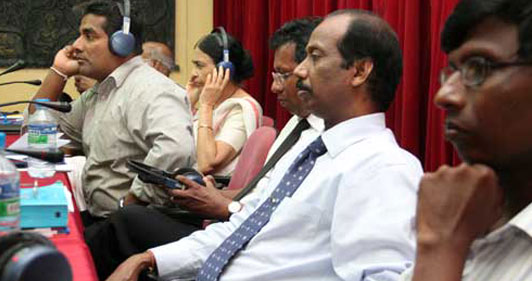A top level professional forum emphasized the urgent need for people’s right to information identifying it as an integral part of a functioning democracy.
The Right to Information Bill emerged a few times during the last two decades, without actually making significant progress, though many South Asian countries such as India, Pakistan, Nepal and Bangladesh have adopted Right to Information laws, professional forum said in the seminar.
The fact that the underlying reason for all prevailing issues was the citizen’s inability to access required information was also underscored at the forum titled “People’s Right to Information” involving a panel discussion organized by the Transparency International Sri Lanka (TISL) along with the Alliance of Media Organizations and the Commonwealth Human Rights Initiative.
Panellists for the seminar were Prof. Savithri Gunasekera, Attorneys-at-Law, J.C. Weliamuna and S.G. Punchihewa, Faculty of Law Senior Lecturer V.T. Thamilmaran and Sunil Jayasekara, a journalist affiliated to the Free Media Movement (FMM).
Ninety countries worldwide including four in the South Asian region namely; Pakistan, India, Nepal and Bangladesh have implemented the Right to Information (RTI) Law in their countries.
Speakers at the discussion noted that issues such as corruption in India have become a known phenomena primarily because of the practice of this law. The RTI law in Sri Lanka was first suggested in the early 1990s. In 2003 the bill was drafted but not passed as a result of the change in Government; then it was presented as an individual Bill by Karu Jayasuriya and not passed.
Meanwhile, Mr. Weliamuna argued that, if Members of Parliament, who are the representatives of the public, have access to all the information they require, it is illogical not granting the same rights to the public, who are being represented by the Parliamentarians.
“Ministers are political representatives who have been appointed by the public; the reason being that us as the public being unable to be in Parliament. If democracy is the voice of the people and for the people; by RTI not being practiced, is it fair to say that democracy is practiced in the country?”
Though Sri Lanka is a country that has ratified the International Convention on Civil & Political Rights, which includes Right to Information, it is yet to be incorporated into its domestic law. Prof. Savithri Gunasekera said that the law could be established with restrictions on a reasonable basis, if the need is there to limit access to information.
“But once the law is in place, an independent monitoring body should be established to confirm its proper implementation,” she said, adding that other rights such as Right of Expression and Thought too should be strengthened, along with the establishment of new rights. “Even in universities, Right to Information is not a common feature,” she said, explaining the lack of transparency when marking exam papers.
Attorney-at-Law S.G. Punchihewa said that Sri Lanka has been experiencing emergency law for 30 years, raising eyebrows on the definition of emergency, as we had it for such a long time. He explained that there should be more transparency as to how things take place in the country, as the public is unaware most of the time.
What they know is when food prices are increased to coincide with a sports event such as the Cricket World Cup, or a political event such as the UN Panel Report.
Embarking on the elements of RTI was Law Faculty Senior Lecturer V.T. Thamilmaran who observed that while it was important for individuals to have the right to seek and receive information, it was equally important for the information to be imparted to others. He added that information was an asset and although the public did not demand information from the authorities, it was their responsibility to make it available to all.
Free Media Movement representative Sunil Jayasekara speaking from the standing of a journalist noted that as a result of the law not being practiced, media personnel have to be shrewd in their ways of obtaining information, “We ultimately succumb and resort to the undignified way out.”

